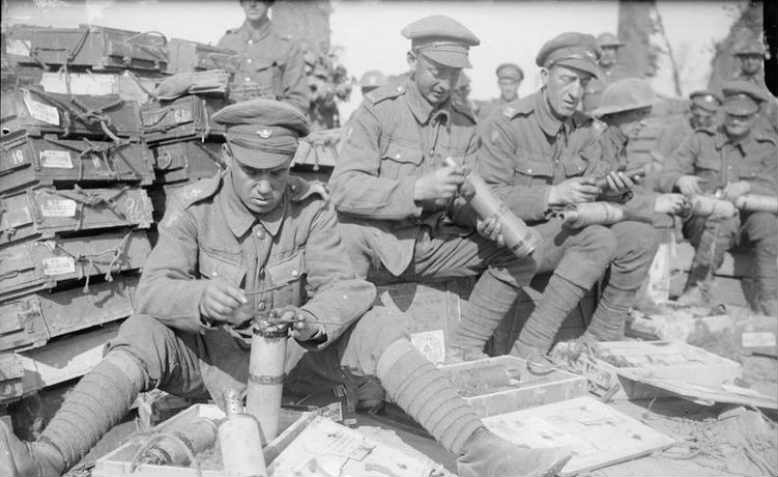 Men of the King's Own Yorkshire Light Infantry fusing trench mortar shells at The Battle of Passchendaele, 1917. Photo: Wikimedia/John Warwick Brooke
Men of the King's Own Yorkshire Light Infantry fusing trench mortar shells at The Battle of Passchendaele, 1917. Photo: Wikimedia/John Warwick Brooke
We cannot let our histories become grist for the bosses’ war drive, argues Mick Wattam
I have recently become aware of the plan to install a public memorial in Elmfield Park in Doncaster to honour the Kings Own Yorkshire Light Infantry (KOYLI) and the thousands of local men who joined its ranks up until its demise as a regiment of the British Army in 1968.
A regimental museum already exists within Doncaster Museum and Art Gallery, but some veterans and supporters including Doncaster Free Press want to see a statue placed near to the museum to help keep alive the KOYLI name.
If there is significant support for the KOYLI regimental association’s call for a public memorial in our town, then out of the respect for all those from the regiment who died or suffered in any way during the wars it participated in, then I would acknowledge and support their right to have a memorial.
I personally prefer to wear a white poppy for peace rather than the red one which has become more and more associated with the protagonists of war and the huge arms corporations who profit from it, I fully understand how people want to come together and remember the victims of war whose numbers still increase by the day.
Conscripted
My dad was a KOYLI, called up as soon as he was old enough during WW2, which as far as I believe took him to the Middle East, Italy and Germany.
He never talked about the war, like so many others from his generation who were conscripted into the conflict where they likely faced untold horrors so removed from the expectations, hopes and ambitions they must have had as they began their adult lives.
I remember his reaction when my mum asked him to show me his campaign medals when I was a young boy. He didn’t want to show me his “bloody medals” but did so reluctantly when she persisted. Once I began asking difficult questions, he regretted it and the medals were soon at the back of the wardrobe again.
I know that he was in many ways proud of them and what he had been involved in, but there was obviously a set of related emotions which I would have had no idea of understanding at the time, but I knew full well that it was nothing he would ever want to celebrate.
Like millions of others my dad lived with the effects of experiencing armed combat, and although I will never now know his true thoughts about it and the extent to which it affected or shaped his life, there were personality traits and visual signs which I never realised were connected to the war until his last years.
I was chatting to someone at work one day when it became apparent that he knew my dad from just after the war, as he remarked “Oh, you’re Shellshock’s son, aren’t you?” I had never heard my dad called this before, and although it was a remark I didn’t particularly like hearing, it made sense to me instantly as he had always had a facial twitch and an unusual involuntary shaking of the head which got worse when he was aggravated, which I had always put down to the stresses of life and particularly the tension in his relationship with my mum.
However, I did know that he had suffered a head wound while in Italy and spent many weeks in a field hospital over there. I had never connected the two things up until this point, overlooking it presumably because of the lack of conversation about his war experience.
Continuous
Looking at the photographs available online of the finished statue proposed to sit amongst the rose beds in Elmfield Park where many people happily pose for wedding photographs after leaving the adjacent registry office, over 3.5 metres high including the plinth, I have to say that it is not an image which helps us understand or reflect on the tragedy of war.
It is an artless depiction of a soldier on patrol, gun at the ready, familiar to any youngster who plays Call of Duty or similar computerised war games. To me it seems to celebrate the military and war rather than commemorate the dead and wounded, which fits in with the current political drive for continuous war which we are asked to accept as part of modern life while services and the welfare state are taken away from us.
There may be a small minority of people in Doncaster who want to see this memorial erected in a public place but I fear it will become a symbol for those who promote division and hatred in our society rather than strive for unity and peace. We have seen the collapse of the UKIP vote in Doncaster and across the country, which was always a vote of desperation which turned us against each other. The Tories are now on the ropes and we have a Labour leader who opposes all war and offers a way forward for us to reconstruct a society based on the needs of all of us.
Now is not the time for us to be erecting symbols of aggression.

